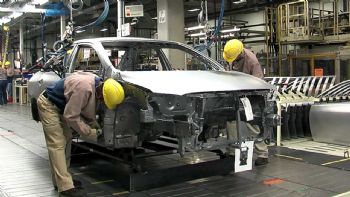
Toyota Motor Corp, which says that it is looking to use more aluminium in car bodies, believes that it faces only “a minor risk” of increased material costs if the Trump administration in the USA begins to introduce “trade remedies” against steel and aluminium imports.
Jim Lentz, CEO of Toyota Motor North America, says the Japanese car maker believes that “replacing steel bodies with lighter aluminium will be necessary to comply with tightening fuel-economy standards.
“Powertrain modifications alone won’t do the trick; we have to look at many, different ways to improve fuel economy, so we will be looking at more and more ways to use lightweight materials like aluminium in future products.”
US president Donald Trump recently ordered his Commerce Department to investigate the effects of global over-capacity in steel and aluminium on US metal producers.
His chief spokesman said that cheap steel and aluminium have “flooded the global market in recent years”, leading to artificially low prices, and that “low profits prevent US steel and aluminium producers investing in the development of higher-grade metals and retaining a skilled workforce.”
Eight US-based smelters have either closed or cut their production since 2015, according to the Commerce Department.
Robert Young, Toyota’s vice-president of purchasing and supplier engineering, said: “Toyota is not significantly exposed to imported steel and aluminium, so any impact from tariffs that might be levied would indirectly put pressure on overall market prices and adjust the company’s existing contracts with steel makers.
“If the next generation of steel is developed by our parent company in Japan, an equivalent grade may not be available in the North American market for a period of time. In that case, if there are tariffs, we would ask for an exemption, because we can’t get the equivalent product here.
“However, we would work with our materials engineering division, and with the local integrated steel mills, to develop the equivalent product.
“The goal is to validate and qualify steel and aluminium mills to make the new products as quickly as possible and start production simultaneously in all regions, but a small amount of imports may be needed to bridge the gap until local mills prove they can meet the production standard.”